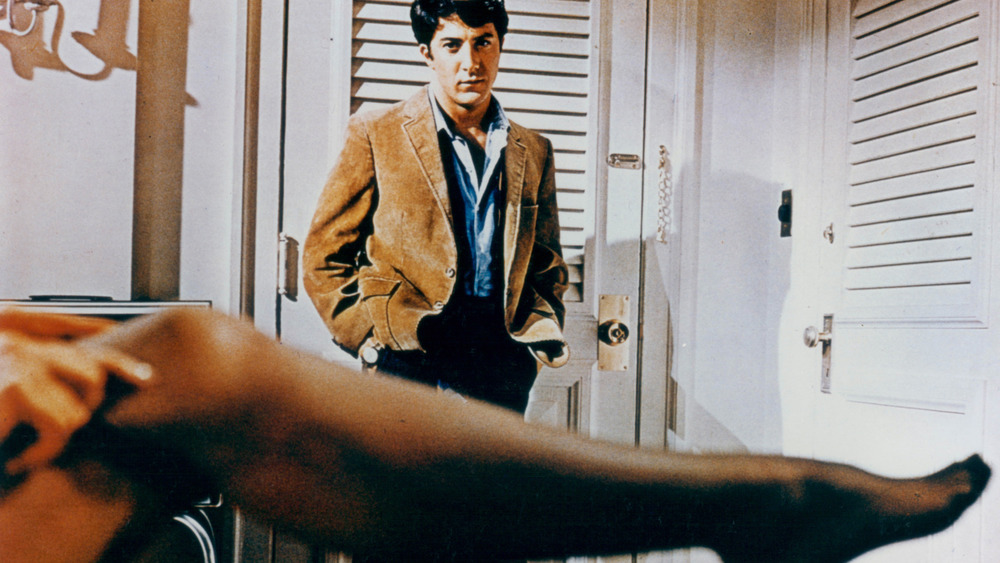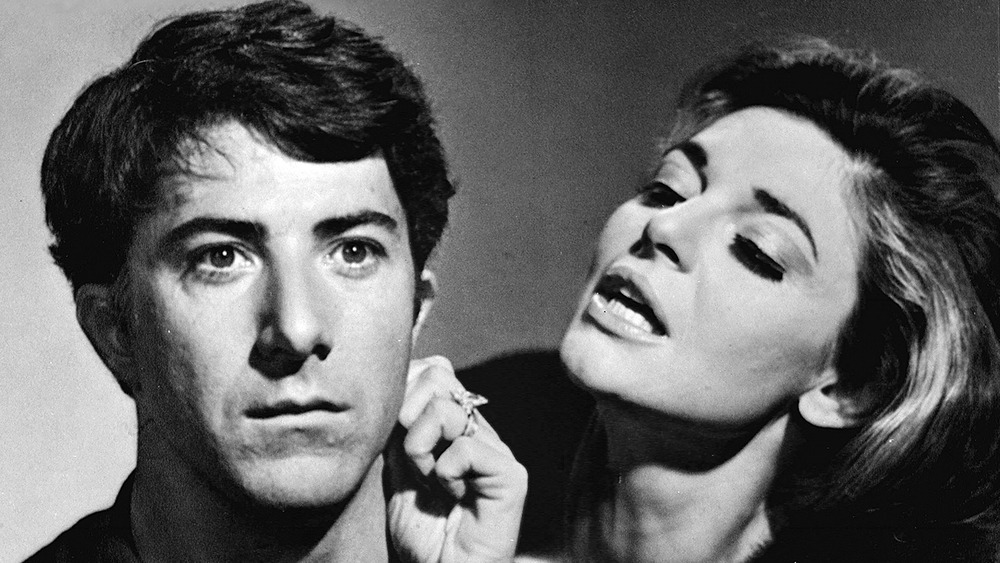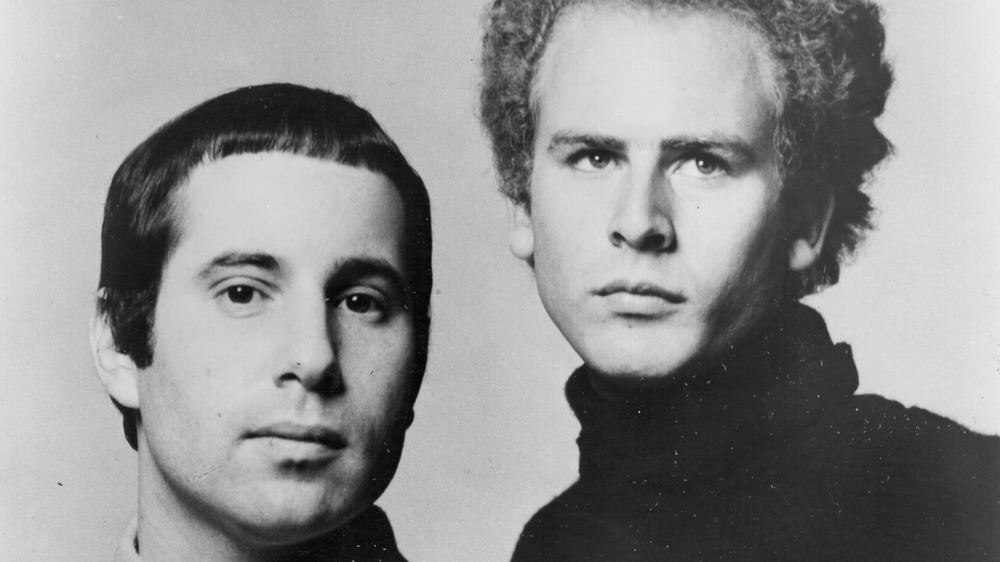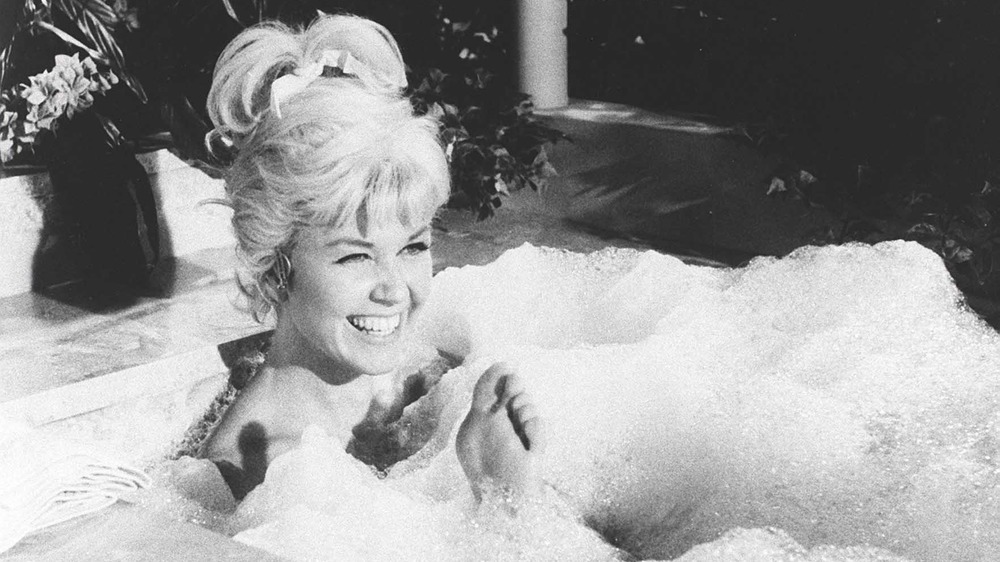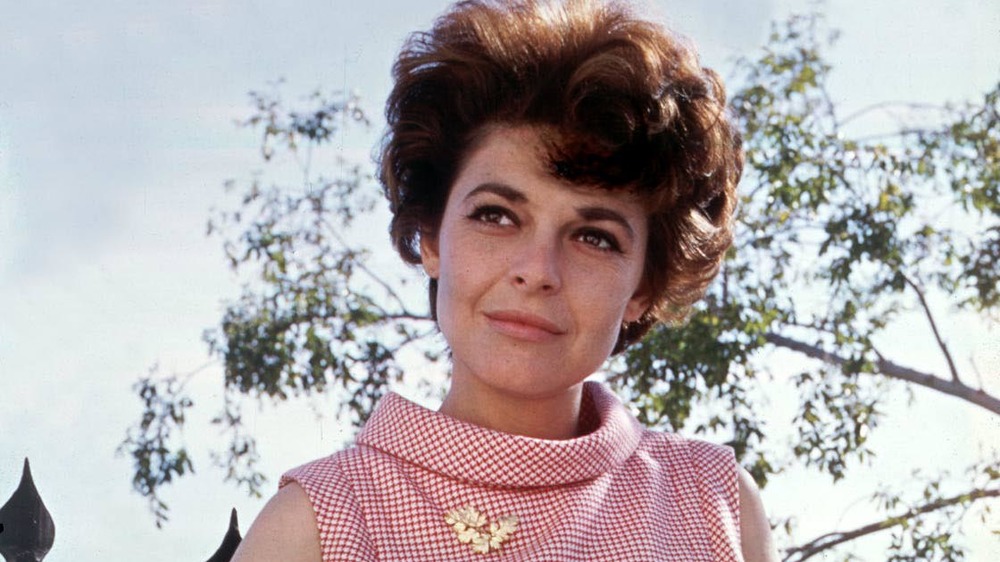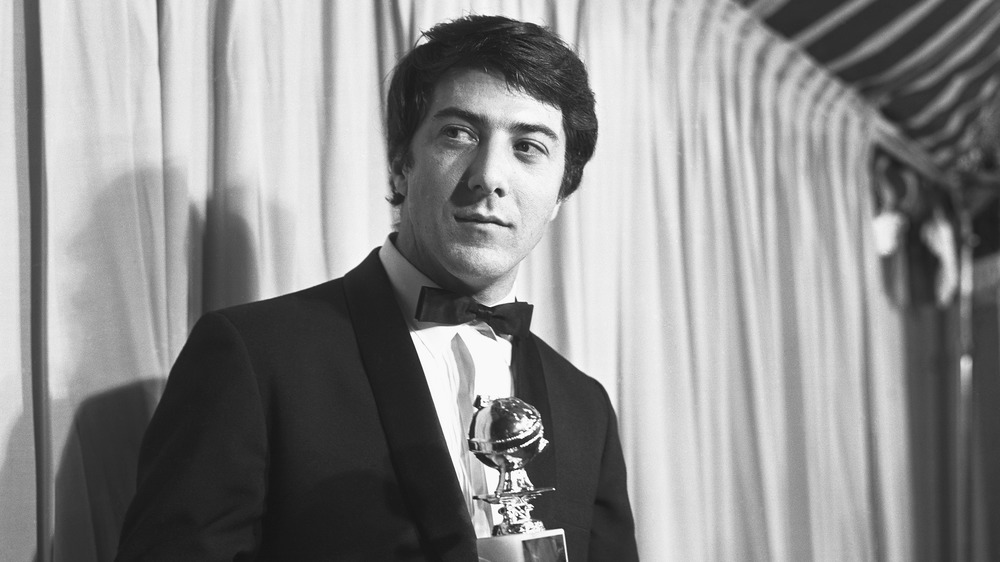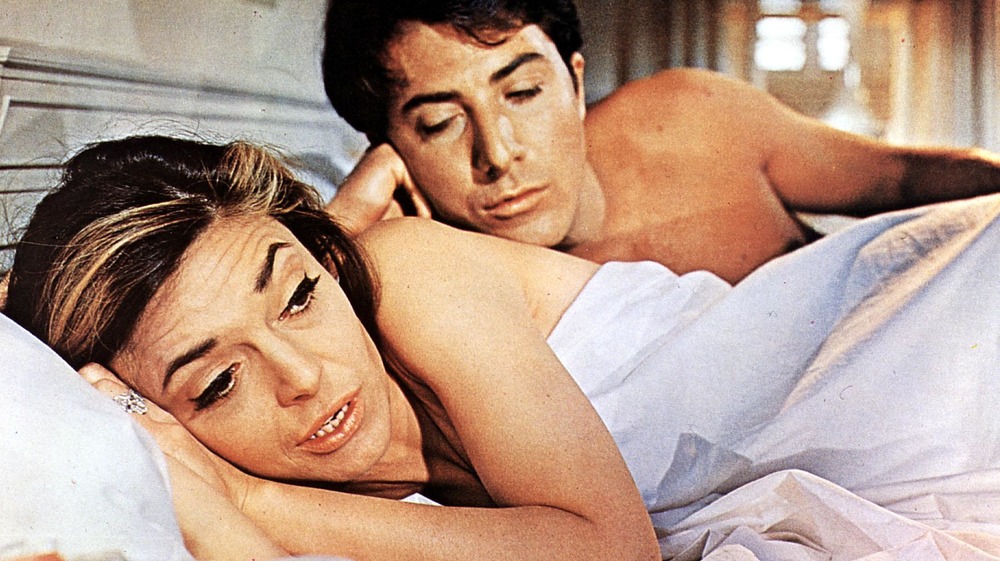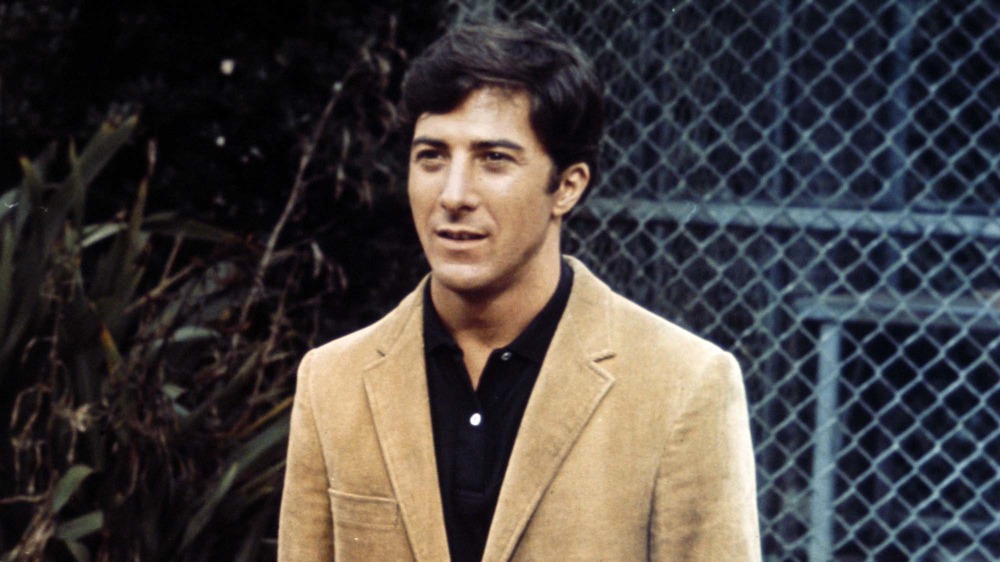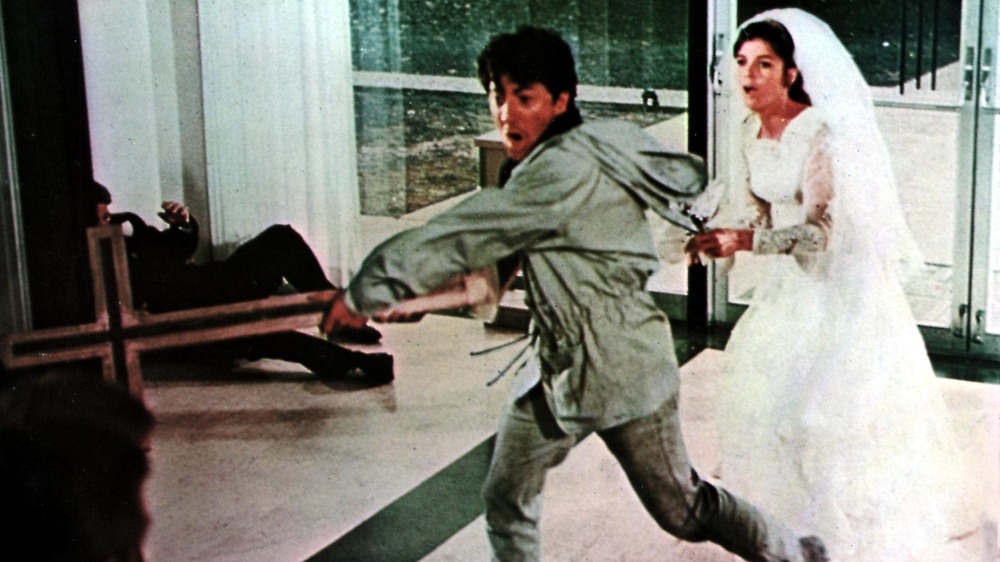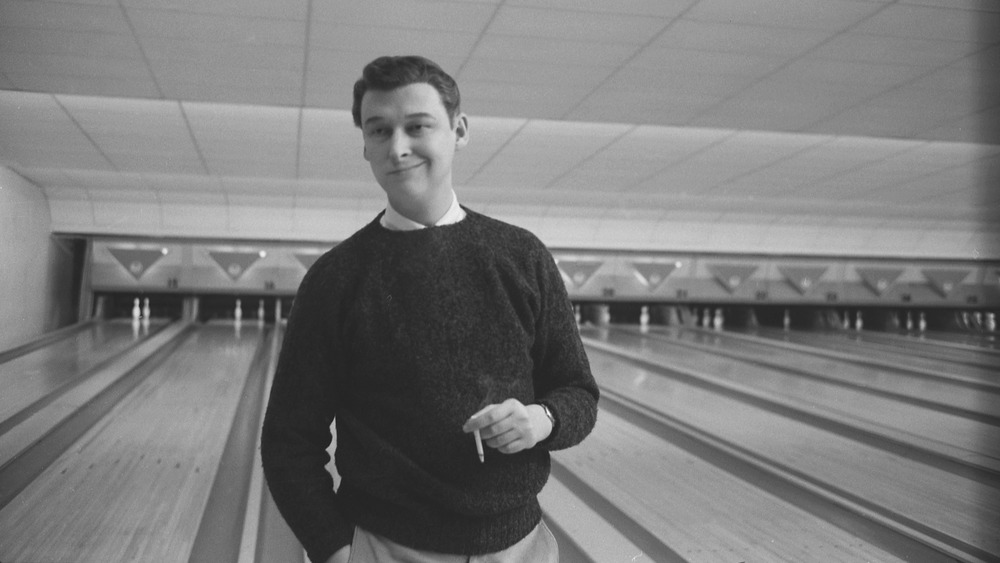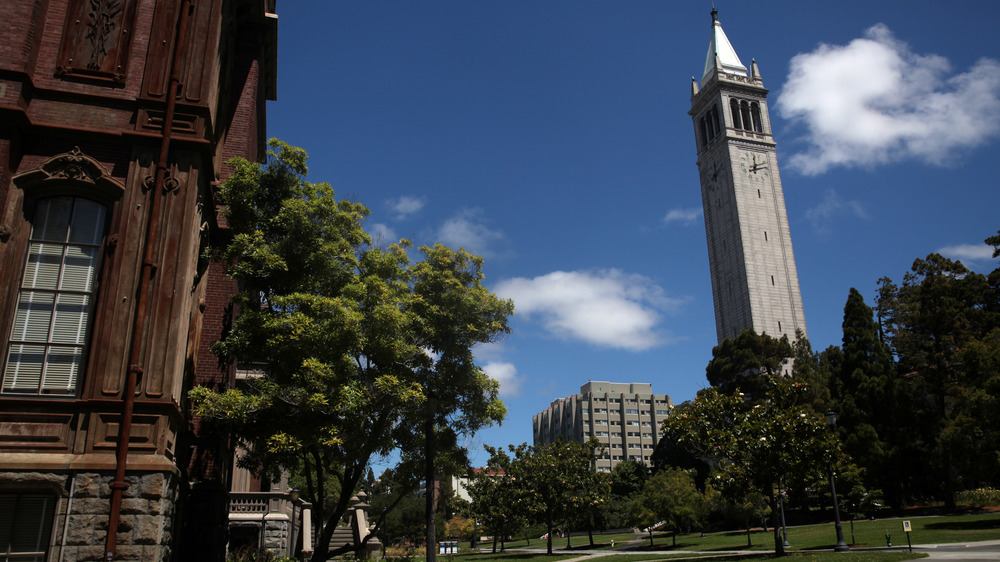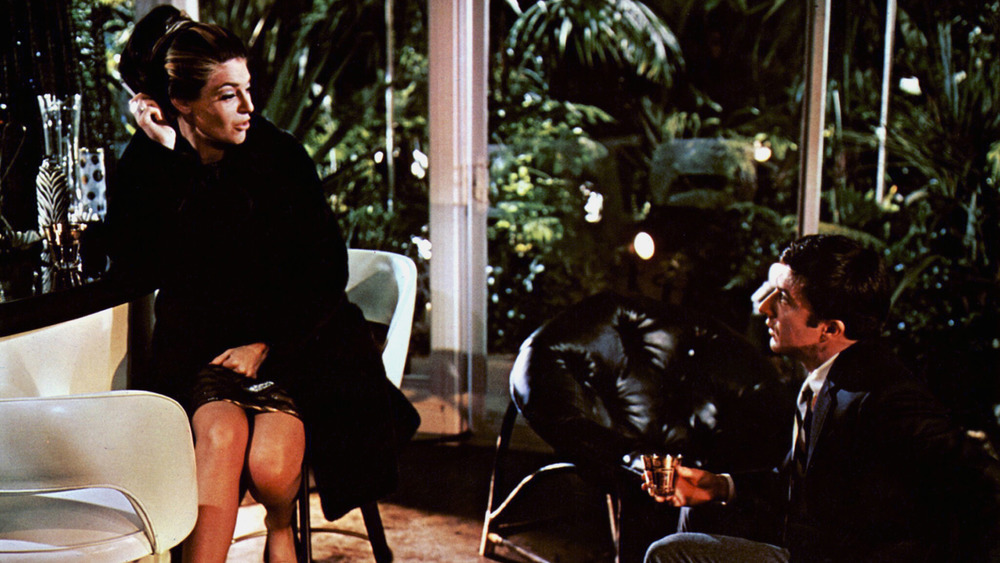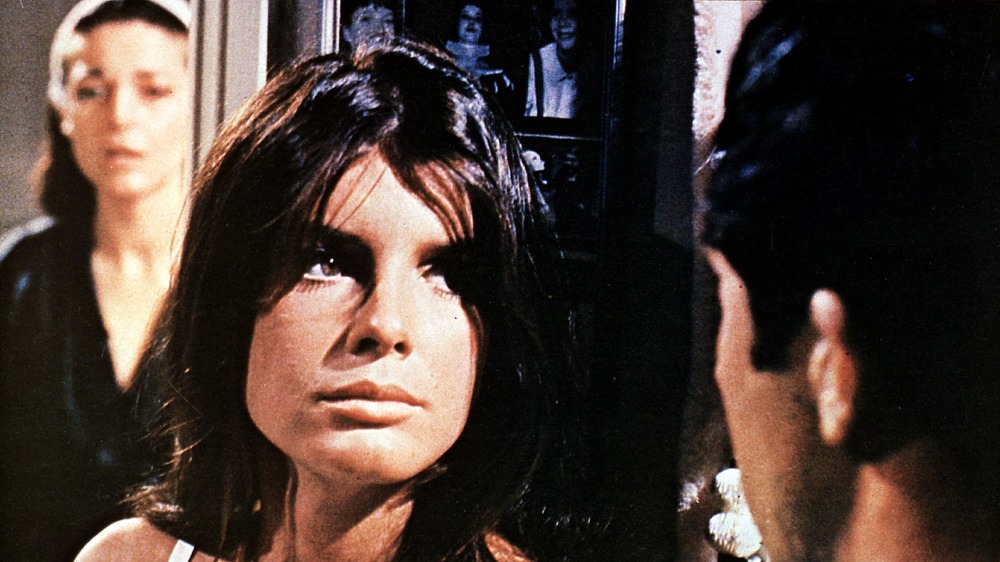The Untold Truth Of The Graduate
"Mrs. Robinson, are you trying to seduce me?"
It's the movie line that makes cinephiles instantly imagine Dustin Hoffman's young, unknown, nervous face as he glares, terrified, into film siren Anne Bancroft's sultry eyes. It's also listed as the #63 movie quote by the American Film Institute (out of 100), according to Open Air Theatre.
The Graduate has become one of the most important classics of the latter half of the 20th century. It had a unique ability to garner acclaim at the Oscars while also scoring big at the box office. Set among the backdrop of the University of California, Berkeley, The Graduate explores the world from a young man's point of view as he prepares to embark upon his harrowing journey into the chaotic real world. The setting is significant, as Berkeley was the very embodiment of hippie counterculture, antiwar sentiment, and radical ideals.
The film made Dustin Hoffman a household name overnight, introduced a mass audience to Simon & Garfunkel, and forced Hollywood to begin pandering to people in their twenties. Read on to learn more about what remains one of the most talked-about American movies in history.
Hollywood and the age illusion
Benjamin is supposed to be a naïve college student to Mrs. Robinson's mature, seductive housewife character. The central taboo of the film is their affair and the age difference between the two. But in reality, the actors were only six years apart. Anne Bancroft was only 35, playing a woman a decade older than herself, and Hoffman was 29 — kind of old for a college student.
According to Vanity Fair, Gene Hackman, who was originally cast in the film as Mr. Robinson, was fired and replaced with someone older in order to really drive home the age difference between Benjamin and Mrs. Robinson. "Unlike Anne and Dustin, in the parts of Benjamin and Mrs. Robinson, the actors needed to be a whole generation apart," said director Mike Nichols. But Nichols wasn't bothered by the real-life six-year age difference, going on to say, "Both actors seemed to be the ages their characters were. That's acting."
Hoffman admitted in the Vanity Fair exposé that he was a "neophyte," with The Graduate being his first lead film role, and that Bancroft was "an accomplished actress," so he felt they had a unique and special relationship with one another. "You're either working with people who are going for the same truth as you are or you're not. She was. She had a character," Hoffman said about Bancroft.
The story behind the hit Simon & Garfunkel song
Mike Nichols approached Paul Simon to write three original songs for the film. One song that wasn't meant for the film made the cut. Originally, the first line to the famous "Mrs. Robinson" tune was "Here's to you, Mrs. Roosevelt."
In a Variety article by Peter Bart in the May 15, 2005, print issue (via Plansponsor), Mike Nichols reminisces on the song's conception. "It's a song about times past — about Mrs. [Eleanor] Roosevelt and Joe DiMaggio and stuff," Simon said. Nichols replied, "It's now about Mrs. Robinson, not Mrs. Roosevelt." Though the song became famously tied to the film, only a small portion of the chorus of the song actually makes the cut of the movie, which leads to speculation that the song wasn't even completed until after the film came out.
"Mrs. Robinson" became one of the most famous movie songs in film history and was also a No. 1 hit, along with the soundtrack album, which was released in 1968. Due to the film's success, the fairly obscure New York art/folk duo gained an entirely new audience. The song also appeared on Simon & Garfunkel's following studio album Bookends.
Actors who almost got the lead roles in The Graduate
Movie fans have all heard stories of how their favorite, memorable characters were almost played by different actors, and it's common that a director's first choice for a role doesn't pan out. Al Pacino turned down the role of Han Solo in the Star Wars franchise, Marilyn Monroe was offered the part of Holly Golightly in Breakfast at Tiffany's, and Gwyneth Paltrow was James Cameron's first choice for Rose in Titanic, among many other examples.
In the case of The Graduate, it could have been an entirely different film if the actors Mike Nichols originally intended to work with had been cast in the two lead roles. Many stars auditioned or were approached for the roles of Benjamin and Mrs. Robinson. Doris Day could have played Mrs. Robinson. According to Vox, Nichols approached Day, but she turned it down, noting that the part "offended [her] sense of values." Other actresses considered for the part included Rita Hayworth, Ava Gardner, and Ingrid Bergman.
Robert Redford, who fit the physical description of Benjamin in the eponymous novel the film was adapting, screen-tested for the part. Apparently, during the session, Nichols questioned whether Redford could play a loser who was capable of being rejected by women, and he decided Redford didn't have the life experience to take on the character.
Anne Bancroft was advised not to take the role of Mrs. Robinson
By the mid-1960s, Anne Bancroft had garnered a reputation as a serious film and stage actress who was known for playing wholesome and innocent roles like her award-winning turn as blind Helen Keller tutor Annie Sullivan in The Miracle Worker (both on Broadway and in the film adaptation). Many were concerned that the racy, controversial role of Mrs. Robinson in The Graduate might ruin her career. "Everyone cautioned her to turn it down," Mike Nichols told Vanity Fair. "How can you go from the saintly Annie Sullivan to the Medusa-like Mrs. Robinson? Too risky."
It's hard to imagine by today's standards that this type of role would legitimately concern an actress about her future career prospects, but then again, The Graduate was made just on the cusp of the beginnings of the sexual revolution. Mel Brooks, Anne Bancroft's husband, convinced her to do the film. Mel reportedly liked the script and had worked with its screenwriter. She followed his gut instinct, and in the end, Anne nabbed a Best Actress Oscar nomination for The Graduate.
Despite the accolades she received for the role, Bancroft admitted to being resentful of only becoming known as "Mrs. Robinson" for the rest of her career. "I'm still trying to get away from it," she told the LA Times in 1997.
Dustin Hoffman turned down The Producers to play Benjamin
Before Spaceballs and Blazing Saddles, there was The Producers. Mel Brooks' freshman film broke comedic boundaries by making the Nazis funny and was a wildly popular movie that eventually became a successful musical and won Brooks an Oscar for Best Original Screenplay.
Before The Graduate, Dustin Hoffman had a few minor film roles under his belt, but he was mostly known as a strong stage actor. According to IndieWire, when Mel Brooks approached Hoffman to be in The Producers, he originally said yes to playing the "fanatical Hitler supporter, Liebkind," but asked Brooks' permission to audition for The Graduate.
Mel Brooks agreed, as he was aware of the script, considering that his wife was already slated to star in it, and didn't think Hoffman stood a chance. "I thought this was all too bizarre," Brooks said. "Go, you're a mutt. The minute they see you on film, they'll say we got the wrong guy. He called me back two days later and said they want me." Hoffman's career move made him instantly famous and led him on an upward trajectory to becoming one of the most acclaimed dramatic actors of his time.
Did Hoffman think that would happen? "Every studio turned it down," says producer Lawrence Turman in a New York Post interview. "They read the book and hated it, and no one thought it was funny." So no, Hoffman wasn't expecting it.
The Graduate was a surprise hit
Based on a low-selling, virtually unknown 1963 novel of the same name by Charles Webb, the rights to The Graduate weren't on Hollywood's radar. Mike Nichols was still a very green director at this point, and actor-turned-hired writer Buck Henry had no screenwriting experience. The film was also notoriously challenging to cast, according to Sven Mikulec of Cinephilia & Beyond.
Did we mention no one knew who Dustin Hoffman was? When he auditioned for the part of Benjamin, he was no more than an off-Broadway actor. Katherine Ross, who plays Elaine, implied that "he crawled from under a rock." But the film was finally acquired for a very low price and financed by Embassy Pictures. The first screenings of the initial cut didn't impress executives, either. They didn't like Nichols' choice for the leading man.
Much to everyone's surprise, however, the obscure, low-budget indie with an unknown star was a runaway hit and scored big at the box office. Hollis Alpert, a film critic at the time, recalls in The Guardian that "lines extended around the corner all the way down the block, much like those at the Radio City Music during holiday periods — except that the people waiting for the next showing were not family groups but mostly young people in their teens and early 20s ... it was as though they all knew they were going to see something good, something made for them."
Dustin Hoffman was a radical casting choice
Dustin Hoffman was the physical opposite of the book's lead character, Benjamin Braddock, who looked more like Mike Nichols' first choice, Robert Redford. The character is described in the book and screenplay as "a tall, handsome, Californian WASP, more or less," according to Groovy History. Steve McQueen and Warren Beatty, both huge stars at the time, were also being considered. Not only was Hoffman not the right type, but, according to an interview (via Criterion Collection), he nearly blew his audition and even told Nichols he didn't think he was right for the part.
When Nichols decided to cast him, it would shift the Hollywood culture. Screenwriter Buck Henry says in Vanity Fair, "A whole generation changed its idea of what guys should look like [...] I think Dustin's physical being brought a sort of social and visual change, in the same way you talk about Bogart."
The Graduate's wedding scene
The infamous, highly dramatic last scene of The Graduate was inspired by Harold Lloyd's 1924 classic silent comedy Girl Shy. The film is about a shy tailor's apprentice with a stutter who rushes to save the girl he loves from getting married to a bigamist. Mike Nichols was inspired by its climactic "race-to-rescue" scene.
While filming the wedding scene inside United Methodist Church in La Verne, many bizarre complications arose. Apparently, the heat was unbearable, and there were so many people crowded together on the set that Anne Bancroft fainted at one point. According to the Inland Valley Daily Bulletin, Hoffman nearly passed out as well.
But the strangest moment came when Hoffman's character is banging on the balcony glass to get Elaine's attention, who is about to get married below him. He and the cast and crew nearly got thrown out of the church by the pastor, Donald Woods. "In the middle of a take, I hear screaming," Hoffman says in an interview included in the 2015 DVD release. "And it's the reverend! And he's screaming, 'Stop! Stop! Everybody out. That's it. Everybody out!" Apparently, the glass window Hoffman had been banging on was precious and irreplaceable, which is why Hoffman taps on the window with his palms instead of banging with his fists in the final cut.
Dustin Hoffman and Mike Nichols toured college campuses as a PR stunt
There was a real fear that The Graduate was going to flop at the box office after some initial screenings and not-so-favorable crowd reactions on opening night. Producer Joe Levin got so nervous about the film's future that he developed a publicity strategy to send Mike Nichols and Dustin Hoffman to tour college campuses and get the word out. According to Vanity Fair, Hoffman got paid an extra $500 a week for the tour, which was more than he made for shooting the actual film. Nichols doesn't recall the experience fondly. He grew weary of college kids asking him why the film wasn't about Vietnam.
Turns out Levin had no reason to worry, however. The Graduate became the highest-grossing film of 1967 and still ranks in the top 30 of highest domestic grosses. The college tour may have attracted a younger audience, which was appropriate, given that the title character was a college student, and the narrative was from his point of view.
There is a Graduate walking tour at UC Berkeley
A walking tour entitled "The Story of the Graduate Movie" is given at UC Berkeley's campus, taking fans of the film through its backdrops and locations around town.
Stops on the tour include Ben's boarding house, an old Victorian building on campus; the famous Moe's Books, where Ben stalks Elaine; and the Caffe Mediterraneum, where he stops in for a beer. Other notable locations on the tour include the Theta Delta Chi Fraternity house, Sproul Plaza, the Oakland Bay Bridge, and Telegraph Avenue.
The tour, guided by former Berkeley Historical Society president Steve Finacom, claims that it's so popular they may add more tours. "I think people are interested in seeing places from history — even fictional history," Finacom told The Arizona Republic. "The '60s has a hold on the imagination. Berkeley did really capture the attention of the nation in that era."
The Graduate shook up the movie industry
Much like the 1960s shook up American sociopolitical culture, The Graduate was the very definition of a late '60s film: controversial, loud, at times taboo, breaking from convention, and grappling with themes such as youth disillusionment and questioning societal norms. Politico points out that if the film had come out prior to 1967, it might have been dismissed as "cultural slander."
The Graduate came out the same year as the rebellious romantic caper film Bonnie and Clyde and the racially charged Guess Who's Coming to Dinner, but Benjamin isn't exactly a counterculture hippie rebelling against society, as one might expect from a youth-centric film of this time. In fact, he's a bit of a square. But the events that unfold due to decisions he makes along the way conclude in a sort of symbolic character arc that pushes him to his breaking point. As the final scene implies, he makes a conscious decision to break society's rules and attempts to grasp at a life of free will.
The character of Benjamin changed how Hollywood saw leading men as well. As film historian Mark Harris states in Smithsonian Magazine's 50-year anniversary review, before The Graduate, the studios believed "everything should appeal to everyone." After dissecting what made the film so successful, executives came to the realization that "almost half their paying audience was under 24."
The Graduate changed everything, from what movies got made to how they were marketed and who starred in them.
The Graduate's cultural influence
Why does The Graduate still resonate so strongly with movie audiences to this day? It may be that its themes of questioning institutions, including marriage, higher education, and the capitalist model, are all too applicable now.
Inside Higher Ed makes the argument that the film is "an emblem of youth alienation in postwar America." After all, one of the most memorable exchanges of dialogue is when a yuppie family friend of Benjamin's parents gives him a word of advice: "plastics." It's a not-so-subtle allegory of the generational gap and the growing distaste for consumer culture and entering the "adult world."
Reviews in 1967, like one by New York Times critic Bosley Crowther (via Vox), said that it was "one of the best seriocomic social satires we've had from Hollywood." Walking the line between tragi-comedy and political satire may have put the film a bit ahead of its time, seeming more novel to its audience than it would today. But history repeats itself, and the themes of The Graduate certainly hold significance in 2021.
